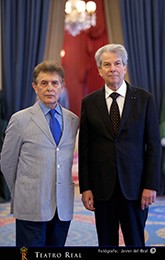
El próximo miércoles, 27 de mayo, volverá al escenario del Teatro Real el único título de ópera compuesto por Ludwig van Beethoven, Fidelio, del que se ofrecerán ocho representaciones desde su estreno y hasta el 17 de junio.
Este canto a la libertad cuenta en la dirección con dos importantes nombres para alzar el telón. El maestro Hartmut Haenchen, especialista en el repertorio alemán y al que hemos escuchado inolvidables interpretaciones en el Real (Lady Macbeth de Mtsensk, Boris Godunov y Lohengrin), se colocará de nuevo al frente del Coro y Orquesta Titulares del Teatro Real y de un reparto encabezado por Michael König (Florestan), Adrianne Pieczonka (Leonora), Franz-Josef Selig (Rocco) y Anett Fritsch (Marzelline) en los papeles principales.
Pier’Alli, director de escena y responsable también de la escenografía, los figurines y la iluminación, se presenta por primera vez en el Teatro Real con una concepción escénica compleja y cargada de simbolismo, despojada de elementos escénicos ornamentales y en la que el apoyo audiovisual es decisivo para reforzar diferentes aspectos de una trama que encierra en sí misma, varias tramas.
Fidelio está inspirada en un hecho real ocurrido en Francia durante el periodo del Terror, aunque el libreto de Jean-Nicolas Bouilly traslada la acción a España para conservar el anonimato. La obra contiene mucho más que una decidida defensa de la justicia y la libertad, es una exaltación del amor y la fidelidad, y tiene el atractivo de que en ella la mujer, Leonore/Fidelio, se convierte en el instrumento conductor y ejecutor, un personaje que lucha por sus principios con todo su ingenio intelectual, abandonando el lugar de víctima, en espera del héroe o de la venganza que, tradicionalmente, se asignaba a la mujer en las óperas.
La complejidad de Leonore se traslada a una partitura con duras exigencias vocales que requieren para el papel protagonista una soprano con recursos líricos y dramáticos, capaz de dibujar una línea de canto expresiva, que son sin duda características precursoras de las heroínas de Wagner, a las que ha dado vida, en numerosas ocasiones, Adrianne Pieczonka.
Fidelio y su emotiva carga ideológica, su canto de lucha y su exaltación del amor y la libertad, es un símbolo capaz de remover la consciencia de la sociedad de hoy en día, por encima de la historia.
En torno al estreno de la ópera se han organizado dos actividades paralelas. El Museo Nacional del Romanticismo acogerá la conferencia de Joaquín Turina, Beethoven en el Madrid romántico, que tendrá lugar el 28 de mayo a las 19.00 horas en el auditorio del museo. Y en el ciclo Los domingos de cámara, solistas de la Orquesta Titular del Teatro Real interpretarán un programa dedicado íntegramente al compositor alemán, el 7 de junio a las 12.00 horas en la sala principal del Teatro.
